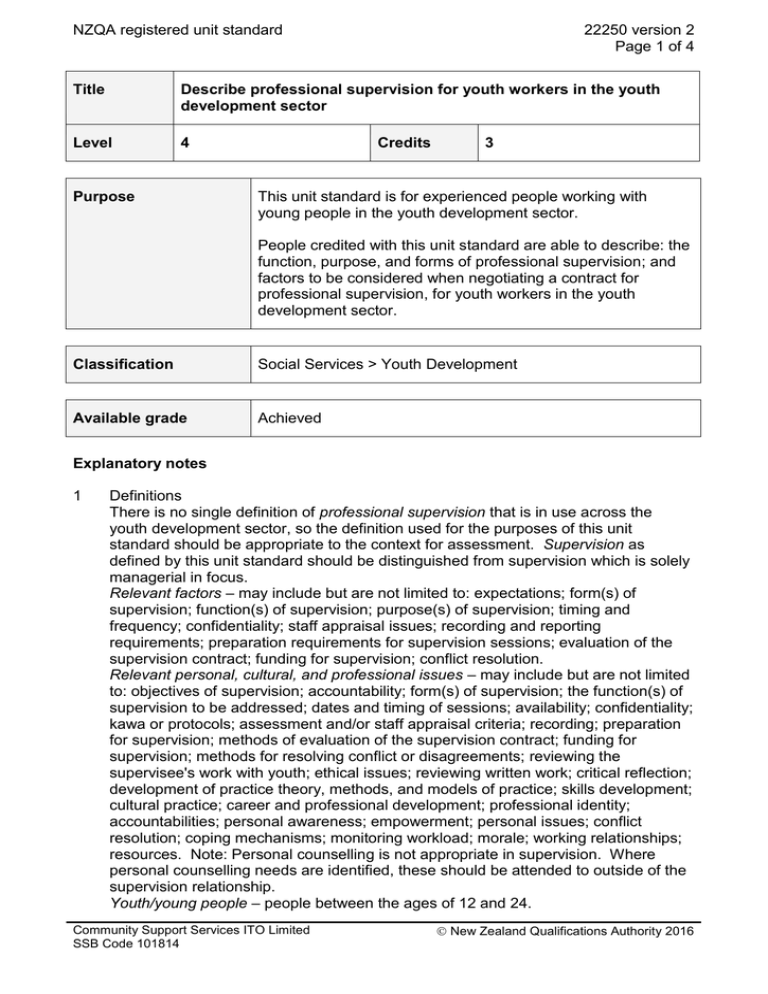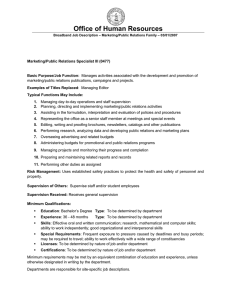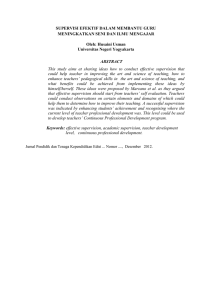NZQA registered unit standard 22250 version 2 Page 1 of 4
advertisement

NZQA registered unit standard 22250 version 2 Page 1 of 4 Title Describe professional supervision for youth workers in the youth development sector Level 4 Purpose Credits 3 This unit standard is for experienced people working with young people in the youth development sector. People credited with this unit standard are able to describe: the function, purpose, and forms of professional supervision; and factors to be considered when negotiating a contract for professional supervision, for youth workers in the youth development sector. Classification Social Services > Youth Development Available grade Achieved Explanatory notes 1 Definitions There is no single definition of professional supervision that is in use across the youth development sector, so the definition used for the purposes of this unit standard should be appropriate to the context for assessment. Supervision as defined by this unit standard should be distinguished from supervision which is solely managerial in focus. Relevant factors – may include but are not limited to: expectations; form(s) of supervision; function(s) of supervision; purpose(s) of supervision; timing and frequency; confidentiality; staff appraisal issues; recording and reporting requirements; preparation requirements for supervision sessions; evaluation of the supervision contract; funding for supervision; conflict resolution. Relevant personal, cultural, and professional issues – may include but are not limited to: objectives of supervision; accountability; form(s) of supervision; the function(s) of supervision to be addressed; dates and timing of sessions; availability; confidentiality; kawa or protocols; assessment and/or staff appraisal criteria; recording; preparation for supervision; methods of evaluation of the supervision contract; funding for supervision; methods for resolving conflict or disagreements; reviewing the supervisee's work with youth; ethical issues; reviewing written work; critical reflection; development of practice theory, methods, and models of practice; skills development; cultural practice; career and professional development; professional identity; accountabilities; personal awareness; empowerment; personal issues; conflict resolution; coping mechanisms; monitoring workload; morale; working relationships; resources. Note: Personal counselling is not appropriate in supervision. Where personal counselling needs are identified, these should be attended to outside of the supervision relationship. Youth/young people – people between the ages of 12 and 24. Community Support Services ITO Limited SSB Code 101814 New Zealand Qualifications Authority 2016 NZQA registered unit standard 22250 version 2 Page 2 of 4 Youth development sector – a situation where youth development practice is being used intentionally to promote positive development of young people. Examples include education, sport, community development, religious groups, cultural groups, and interest groups. 2 Resources Bradley, John; Jacob, Emma; Bradley, Richard. (1993). 'Reflections on culturally safe supervision, or why Bill Gates makes more money than we do'. Social Work Review: Te Kōmako, vol. 11, no. 4, pp. 3-6. Knapman, Jacky; Morrison, Tony. (1998). Making the most of supervision in health and social care: A self-development manual for supervisees. Brighton, England: Pavilion. Ministry of Youth Affairs. (2002). Youth Development Strategy Aotearoa – Action for child and youth development. Wellington: Ministry of Youth Affairs. Available online from the Ministry of Youth Development (http://www.myd.govt.nz), along with supporting documents. O'Donoghue, Kieran. (1998). Supervising social workers: A practical handbook. Palmerston North: Massey University, School of Social Policy and Social Work. Webber, Emma. 1999. 'He taonga mo o matou tipuna (A gift handed down by our ancestors): An indigenous approach to social work supervision'. Social Work Review: Te Kōmako, vol. 11, no. 4, pp. 7-11. Policy and practice statements, journal articles, and codes of ethics of professional associations in the social services in Aotearoa New Zealand. United Nations Declaration of the Rights of the Child. Available at http://www.un.org/cyberschoolbus/humanrights/resources.asp. Convention on the Rights of the Child. Available through http://www.unicef.org/crc/. Outcomes and evidence requirements Outcome 1 Describe the function, purpose, and forms of professional supervision for youth workers in the youth development sector. Evidence requirements 1.1 The key functions of professional supervision are described in terms of relevance and responsibilities. Range 1.2 includes but is not limited to – administrative and managerial; educational and mentoring; and enabling and supportive. The key purposes of professional supervision are described in terms of benefits to the youth worker. Range evidence is required of three key purposes and one benefit for each purpose. Community Support Services ITO Limited SSB Code 101814 New Zealand Qualifications Authority 2016 NZQA registered unit standard 1.3 22250 version 2 Page 3 of 4 The main forms of professional supervision are described in terms of relevant situations in the youth development sector. main forms may include but are not limited to – individual, group, team, tag, peer, cultural, internal supervision, external supervision; evidence is required of three main forms and one relevant situation for each form. Range Outcome 2 Describe factors to be considered when negotiating a contract for professional supervision for youth workers in the youth development sector. Evidence requirements 2.1 Relevant factors to be considered are described in terms of own selfdevelopment requirements. Range 2.2 evidence is required of four relevant factors. Relevant personal, cultural, and professional issues to be considered are described in terms of own self-development requirements. Range evidence is required of four relevant personal, cultural, and professional issues. Planned review date 31 December 2019 Status information and last date for assessment for superseded versions Process Version Date Last Date for Assessment Registration 1 26 November 2007 31 December 2016 Review 2 19 March 2015 N/A Consent and Moderation Requirements (CMR) reference 0222 This CMR can be accessed at http://www.nzqa.govt.nz/framework/search/index.do. Please note Providers must be granted consent to assess against standards (accredited) by NZQA, before they can report credits from assessment against unit standards or deliver courses of study leading to that assessment. Industry Training Organisations must be granted consent to assess against standards by NZQA before they can register credits from assessment against unit standards. Providers and Industry Training Organisations, which have been granted consent and which are assessing against unit standards must engage with the moderation system that applies to those standards. Community Support Services ITO Limited SSB Code 101814 New Zealand Qualifications Authority 2016 NZQA registered unit standard 22250 version 2 Page 4 of 4 Requirements for consent to assess and an outline of the moderation system that applies to this standard are outlined in the Consent and Moderation Requirements (CMR). The CMR also includes useful information about special requirements for organisations wishing to develop education and training programmes, such as minimum qualifications for tutors and assessors, and special resource requirements. Comments on this unit standard Please contact the Community Support Services ITO Limited info@careerforce.org.nz if you wish to suggest changes to the content of this unit standard. Community Support Services ITO Limited SSB Code 101814 New Zealand Qualifications Authority 2016

